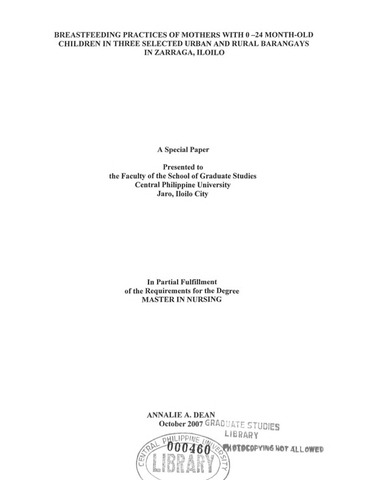Breastfeeding practices of mothers with 0-24 month-old children in three selected urban and rural barangays in Zarraga, Iloilo

Page views
687Дата
2007Автор
Thesis Adviser
Defense Panel Chair
Share
Metadata
Показать полную информацию
Аннотации
Summary
This study was designed to determine the feeding practices of mothers with 0-24 month old children and whether knowledge about breastfeeding and attitude towards breastfeeding is related to their feeding practices. It also intended to find out whether the mothers’ level of knowledge about breastfeeding, and attitudes toward breastfeeding practices vary according to their age, educational attainment, occupation, income, place of delivery and number of children ever born. Furthermore, this study intended to find out whether or not there is a significant relationship between mothers’ level of knowledge about breastfeeding and attitude towards breastfeeding, level of knowledge about breastfeeding and feeding practices of mothers and between level of knowledge about breastfeeding and feeding practices of mothers.
This is a descriptive-relational study which employed the one-shot survey design. It employed statistical tools such as frequencies and percentages, mean, one way analysis of variance (ANOVA), Z-test for the difference in proportions, Gamma and Pearson’s r.
The following were revealed by the study:
Characteristics of the Respondents
Most of the mothers were 30 - 47 years old. The median age was 30.45. Most of them had attended or completed high school and were gainfully employed and those working were engaged in professional or technical jobs or engaged in sales or business, working as laborers in the farm or were tending farm animals. Slightly more than half had monthly family incomes of Php 1000 - 5000 and delivered their children at home. Majority of the mothers had 1 - 3 children and the average number of children of the respondents was 3.24.
Knowledge about Breastfeeding
The top four benefits or advantages of breastfeeding on which majority of the respondents were knowledgeable about were: 1) breast milk is the ideal and complete food for babies, 2) breastfeeding fosters closer mother-child relationship, 3) breast milk is economical, and 4) colostrums which is the first milk contains antibodies protects that protect the baby against many childhood diseases. More than three-fourths correctly answered that breast milk is ready at all times. More than half were aware that that the size a woman's breast does not affect the amount of milk produce, that babies should be breastfed as long as they want, that breast milk has low content of milk sugar, and that continuous breastfeeding for 5-6 months delays the onset of menstruation.
Attitude towards breastfeeding
Questions on attitude towards breastfeeding were responded favorably by the majority of the mothers. Among the questions to which more than three-fourths expressed positive attitudes were: 1) willing to breastfeed even if the flow of milk stops during the first day, 2) willing to breastfeed her baby for six months, 3) willing to continue breastfeeding even if her nipples get sore, 4) willing to breastfeed even if she has inverted nipples. 5) would still breastfeed even if she has fever, 6) willing to allow her baby to suck milk thirty minutes after delivery, 7) would still breastfeed even if she has to return to work. 8) will not offer a pacifier when the baby cries, 9) will not opt for bottle feeding even if little milk appears during the first day, 10) willing to continue breastfeeding even if the baby has diarrhea, and 11) believes that breastfeeding does not cause bad posture.
Feeding Practices of Mothers with 0-24 Month Old Children
Majority of the mothers practised breastfeeding. Of the seventy-seven mothers who breastfed, a little over half engaged in exclusive breastfeeding.
Among the reasons cited by the mothers for not practising breastfeeding are: the mother is taking pills and the flow of milk stopped. Ten of these mothers who did not breastfeed but had breastfed their infants before, initiated breastfeeding right after delivery.
Nine of these mothers breastfeed for 1 to 2 weeks and only one for 2 to 4 weeks but then stopped breastfeeding because the flow of milk stopped. Of those who breastfeed their infants for a time, half of the mothers stopped breastfeeding after 1 to 2 weeks or 3 to 4 weeks.
All the mothers who engaged in both breast and bottle feeding or mixed feeding initiated breastfeeding right after delivery. Most of the infants were breastfed for 3 to 4 months. Of the thirty-two mothers who practised mixed feeding majority stopped pure breastfeeding at 4 - 5 months.
All the forty-five mothers who engaged in pure or exclusive breastfeeding initiated breastfeeding right after delivery and are still practising exclusive breastfeeding at the time of the interview.
Knowledge about Breastfeeding and Attitude towards Breastfeeding
Mothers who are knowledgeable about breastfeeding tended to have favorable attitude towards breastfeeding. This finding supports the hypothesis that mothers with higher knowledge about breastfeeding had better attitudes towards breastfeeding. This also confirms that knowledge significantly influences attitudes of mothers towards breastfeeding.
Relationship between Knowledge about Breastfeeding and Attitude towards Breastfeeding and Feeding Practices
The findings implied a negligible correlation between knowledge about breastfeeding or attitude towards breastfeeding and feeding practices. It does not support the hypothesis that mothers with higher knowledge about breastfeeding or with favorable attitude towards breastfeeding are more likely to practice breastfeeding.
Conclusions
Based on the findings of this study, the following conclusions and generalizations are derived:
1. Age, educational attainment, work status, income, place of delivery of youngest and number of children ever born have no bearing on mothers’ level of knowledge about breastfeeding, attitude towards breastfeeding and their feeding practices.
2. The respondents of this study had high knowledge about breastfeeding.
3. More than half of the respondents have favorable attitude towards breastfeeding. More than three-fourths expressed positive attitudes towards continuing breastfeeding even if the flow of milk stops during the first day, willingness to breastfeed for six months, continuing breastfeeding even if the nipples get sore and even if she has fever or inverted nipples.
4. Majority of the mothers having high knowledge about breastfeeding had favorable attitude towards breastfeeding.
5. Majority of the respondents practiced breastfeeding.
6. The relationship between knowledge about breastfeeding and feeding practices of mothers and attitude towards breastfeeding and feeding practices is not affirmed in the study.
Описание
Abstract only
Suggested Citation
Dean, A. A. (2007). Breastfeeding practices of mothers with 0-24 month-old children in three selected urban and rural barangays in Zarraga, Iloilo (Unpublished Master's special paper). Central Philippine University, Jaro, Iloilo City.
Type
Special paperТематика
Keywords
Department
School of Graduate StudiesDegree
Master in NursingShelf Location
GSL Theses 610.73072 D342
Physical Description
xvi, 82 leaves
Collections
- Master in Nursing [37]



